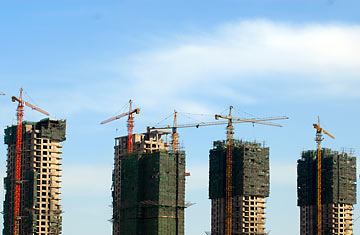
Construction of high-rise buildings in Shenyang, China
While newspapers in the U.S. are still filled with reports of foreclosures and ongoing declines in home prices, the headlines in China tell a different story. One local daily reports that in Shanghai on Oct. 30, more than 200 potential buyers crammed into the sales office of a new housing development, snapping up 120 of the 150 available apartments in just one night. Several weeks earlier in the central Chinese city of Wuhan, 300 people lined up to buy new apartments, some of them arriving two days before the sale. A picture in the local press showed eager customers who brought chairs and folding beds to camp outside the sales office with their families.
Such exuberance is both good news and bad for China's leadership. The revival of the real estate industry is a key reason that China's economy is emerging from the global recession with such strength. But frothy increases in home prices are also fueling concerns that the property boom could turn into an unstable and dangerous bubble. According to government data, property prices in 70 cities rose 3.9% in October from a year earlier — the largest increase in 14 months. In 20 of the cities, prices jumped more than 1% from the month before. The phenomenon isn't limited to just a handful of wealthy cities on China's coast. Towns such as Nanjing, Kunming and Chongqing are experiencing price hikes as well. Though most observers believe China's real estate market is not in a bubble just yet, making sure it doesn't reach that point is one of the biggest challenges facing Beijing today. "Rapidly rising property prices now becomes a top issue for policy makers in China," economists at BofA Merrill Lynch Global Research proclaimed in a recent report.
The reason is that the roaring real estate market is complicating Beijing's decisions on when and how to unwind the drastic stimulus measures that policymakers put in place to combat the global recession. There is clearly a link between Beijing's ultra-loose monetary policy and the run-up in property prices. The amount of new loans granted by Chinese banks in the first 10 months of 2009 surged an eye-popping 144%, to $1.3 trillion, from the same period in 2008. The easy money policy has led to a fantastic increase in property deals — up 82% in October (by volume of floor space) from the same month a year earlier. There is also concern percolating that home prices in major cities are rising out of the reach of the average Chinese. Not only could that cause social discontent, it may also dampen consumption — which China's policymakers desperately need to increase. If families need to allocate more and more of their income to housing, that drains away the cash that's available to buy other consumer goods.
The more prices rise, the more pressure China's central bankers come under to tighten up monetary policy and curtail credit . Some observers in China are already getting nervous. "If the Chinese central bank does not respond quickly to rein in credit growth, unchecked asset bubbles can seriously distort allocation of resources and thereby undermine the country's long-term growth prospects," a Nov. 5 commentary in China Daily warned.
Still, policymakers must tread carefully. With exports improving but still weak, exiting stimulus measures too soon could derail the economy's recovery. Even restraining the property market could affect growth, since investment in the sector — which accounts for a full 10% of GDP — has been a key driver of China's overall economic rebound. Investment in property jumped nearly 18% in the first three quarters of 2009 from the same period in 2008.
For now, China's policymakers are indicating that pro-growth policies will stay in place. Economists don't expect the central bank to hike interest rates until next year. Instead, analysts think the government will try to avoid a real estate bubble by implementing sector-specific measures in the coming months to cool down property prices, like tightening access to mortgages for buyers of second homes — who are more likely to be purchasing apartments as speculative investments.
But economists believe that the longer Beijing keeps the stimulus tap open, the greater the danger that the good times in Chinese real estate could turn ugly. Louis Kuijs, a China economist at the World Bank in Beijing, commented in early November that even though Chinese policymakers may not need a "major tightening" right away, "risks of asset price bubbles and misallocation of resources in the face of high liquidity need to be mitigated." Kuijs concluded that "the overall monetary stance will have to be tightened eventually." Beijing's big test is to make sure that doesn't happen too early — or too late.
— With reporting by Chengcheng Jiang / Beijing
